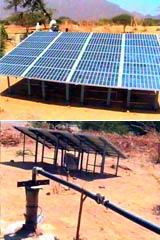Sudan’s Nuba region harnesses the sun’s power for peace
 Monday, Nov 24, 200 (UNDP) — Solar panels are bringing environmentally friendly power to homes, health centres, schools and other facilities in the Nuba mountains in south central Sudan, helping impoverished communities recover from decades of conflict that ended in a ceasefire last year.
Monday, Nov 24, 200 (UNDP) — Solar panels are bringing environmentally friendly power to homes, health centres, schools and other facilities in the Nuba mountains in south central Sudan, helping impoverished communities recover from decades of conflict that ended in a ceasefire last year.
Sudan suffers from a huge shortage of energy, with only 15 per cent of the population, mainly those living in urban areas, linked to power grids.
The ample sunshine in Sudan provides a solution. Decades of experience in other parts of the country prove that solar power is highly efficient in pumping water for villages and small-scale irrigation, and for lighting.
Two UNDP projects, one with solar power expertise and the other working to improve livelihoods and empower women in the Nuba area, are converging to help communities tap the sun’s energy.
Health centres and irrigation pumps in the Nuba region will use solar power, and the initiative is setting up 20 community schools and two market centres that will take advantage of the sun’s energy. The strategy is to locate these activities where they can help forge cooperation between communities long divided by conflict. If successful, it will expand to cover other areas emerging from conflict.
Solar energy has had a remarkable impact on Sudan’s rural communities.
“For the first time, we were able to have a reliable supply of drinking water for ourselves and our animals and plant vegetables for our families without suffering shortages of diesel fuel or engine breakdowns,” said Mohamed Adaroub, a farmer in Kajerat, a village in the east.
Solar energy enables Suliman Ahmed, a teacher at Sinkat Basic School in the same remote area, to use a computer. “It has made our lives so much easier. Now we type, print and share teaching materials, including exams for students instead of using old methods such as writing every thing on the blackboard,” he said.
The project is already helping 13 semi-urban and rural regions improve their standard of living. It fosters partnerships among communities, the private sector, civil society organizations, banks and state governments.
Other steps include lobbying the National Assembly to reduce taxes on solar equipment, raising public awareness about the advantages of solar power through the media, and working with one of the country’s largest banks to set up financing to buy solar equipment. The project also works with the private sector and the Energy Research Institute to organize training for technicians.
So far five states have incorporated solar technology as a sustainable energy source for their development. Now communities in the Nuba mountains will be able take advantage of the progress. The project’s partnership approach is building support from all sectors to harness the sun’s power for peace.
